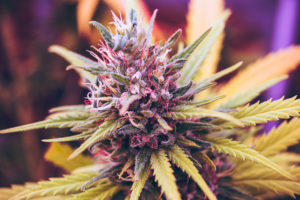by John Garvey
As if cannabis industry professionals and advocates don’t have enough to worry about, the rumor mill has been running hot. The prospect of intellectual property law creating a medical cannabis oligopoly dominated by “Big Pharma” is keeping a lot of people up at night. Epidiolex, the drug developed by GW Pharmaceuticals (NASDAQ: GWPH) has heightened this fear, even as it strengthens the case for removing marijuana from Schedule I of the Controlled Substance Act.

The US Patent and Trademark Office has indeed issued dozens of cannabis-related patents. Most of these relate to cannabis processing, individual products like lozenges, growing techniques and the like. (Here’s one: “Packaged frozen cubes of cannabis juice puree with added decarboxylated cannabis material,” Patent No. 9,956,174). Some patents, however, relate to how derivatives of cannabis (most notably, CBD) can be used in medicine. That understandably worries people.
“This is our concern, Dude.” – The Big Lebowski
GW Pharmaceuticals holds some of the most noteworthy medical cannabis related patents. These make intellectual property (IP) claims on the use of plant-derived cannabinoids for the prevention and treatment of specific medical conditions. And GWPH will use IP to protect its products, including Epidiolex, which the FDA will likely approve any day now.
Is this a big step forward in the treatment of severe epileptic illnesses such as Dravet Syndrome or could it transform medical cannabis into another clunky industry dominated by a handful of giant, politically-connected firms? A lot of that hinges on IP law, which is unfortunately confusing as hell.
Here’s a helpful rundown.
The Skinny
Deferring to the opinions of several law professors and lawyers, I’ve drawn three basic conclusions summarized below. The following paragraphs will give more detailed information for the skeptical and the curious.
A. Plants can be patented, but only if they’ve been significantly altered through selective breeding or genetic manipulation.
B. Naturally-occurring plants and plant compounds cannot be patented or trademarked.
C. Industry professionals have been proactive about keeping special interest groups from abusing intellectual property law.
Legal mumbo jumbo (Disclaimer: It’s actually rather interesting)
Writing for his excellent CannaLaw blog, IP lawyer John Mansfield recently explained how intellectual property law relates to the cannabis industry. The relevant laws include the Plant Variety Protection Act, Plant Patent Act and the Patent Act. Mansfield, in spite of being a lawyer, speaks plain English:
“For [Plant Patent Act] protection, the Patent and Trademark Office requires that a variety be new, nonobvious, and have some de minimus utility, among other things. These requirements are common to all U.S. patents, and are the subject of extensive statutory and case law interpretation. In addition, a patented plant must differ from known plants by at least one distinguishing characteristic which is more than that caused by different growing conditions or fertility.” (emphasis added)
Legal mumbo jumbo (Disclaimer: It’s actually rather interesting)
Writing for his excellent CannaLaw blog, IP lawyer John Mansfield recently explained how intellectual property law relates to the cannabis industry. The relevant laws include the Plant Variety Protection Act, Plant Patent Act and the Patent Act. Mansfield, in spite of being a lawyer, speaks plain English:
“For [Plant Patent Act] protection, the Patent and Trademark Office requires that a variety be new, nonobvious, and have some de minimus utility, among other things. These requirements are common to all U.S. patents, and are the subject of extensive statutory and case law interpretation. In addition, a patented plant must differ from known plants by at least one distinguishing characteristic which is more than that caused by different growing conditions or fertility.” (emphasis added)
Law professor Craig Nard confirms:
“[E]ligibility for patent protection does not depend on whether the substance is living or nonliving. Rather, the key question is whether the inventor has altered nature’s handiwork to the extent the resulting invention can be deemed a nonnaturally occurring substance.”
Nard does warn that individual cannabis strains may become the subject of legal controversy, but not the plant itself or its (naturally occurring) components.

Hands off my stash!
Q: How do you ensure nobody swoops in with a patent attorney and claims ownership of a cannabis strain that was already in use when Nirvana was touring?
A: An insane amount of documentation.
“Cannabis is in danger of going the way the rest of agriculture has gone: toward monoculture, centralization, and restrictive patenting,” states the The Oregon Cannabis Project (OCP), a nonprofit. This danger it the organizers’ call to arms.
The OCP believes that existing patents on cannabis are already too broad and that the industry must take significant measures to protect diversity in the cannabis market. So that’s what they’re doing.
“The OCP’s aim is to have a comprehensive set of genetic data for all cannabis varieties that are either naturally occurring or which have been previously available to the public,” explains the CannaLaw blog. “Either one of these conditions renders such varieties unpatentable.”
The OCP looks like it means business. At least four labs have contributed data on hundreds of strains. If you’re wondering whether your favorite strain safe, you can view the open-source database here. At the request of a “concerned citizen” I checked on a few. Sure enough, I scored three for three: Island Sweet Skunk, Durban Poison and Golden Goat are all “safe.”

If you take nothing else away from this, remember that the novelty requirement is key for receiving a patent. Being the first guy to hire an IP lawyer entitles you to nothing if you haven’t done something value-added.
Rolling it all up
Given the restrictions on patenting living things and naturally-occurring compounds, as well as the cannabis industry’s proactive approach to documenting genetic and chemotypic information, nobody’s going to land an outright patent on weed. CBD, THC, CBN, limonene, myrcene, alpha-pinene, etc, are unpatentable. In fact, given the industry’s ethos about open sourcing valuable IP, the business case for patenting an individual strain—regardless of its characteristics—is arguably far-fetched.
The only clear exception is if a firm like Syngenta or GWPH were to genetically modify a strain of cannabis to make it extraordinarily pest resistant or require, say, 50 percent less water. If they pull that off, more power to ‘em.
The prospect of the USPTO interpreting patent law in a restrictive manner is concerning. Still, only a (highly unlikely) worst-case scenario would wreck the industry. A restrictive IP policy could limit people’s ability to make medical claims—however well-established—and may limit patient access to non-pharmaceutical forms of cannabis. Whatever the case, flower, concentrates and MIPs with diverse properties will likely remain easy to obtain from the recreational side of the industry.
Maybe it’s better to be neurotic than complacent. Industry professionals should continue with initiatives to keep the market open and diverse, but they shouldn’t catastrophize over US Patent and Trademark law.



